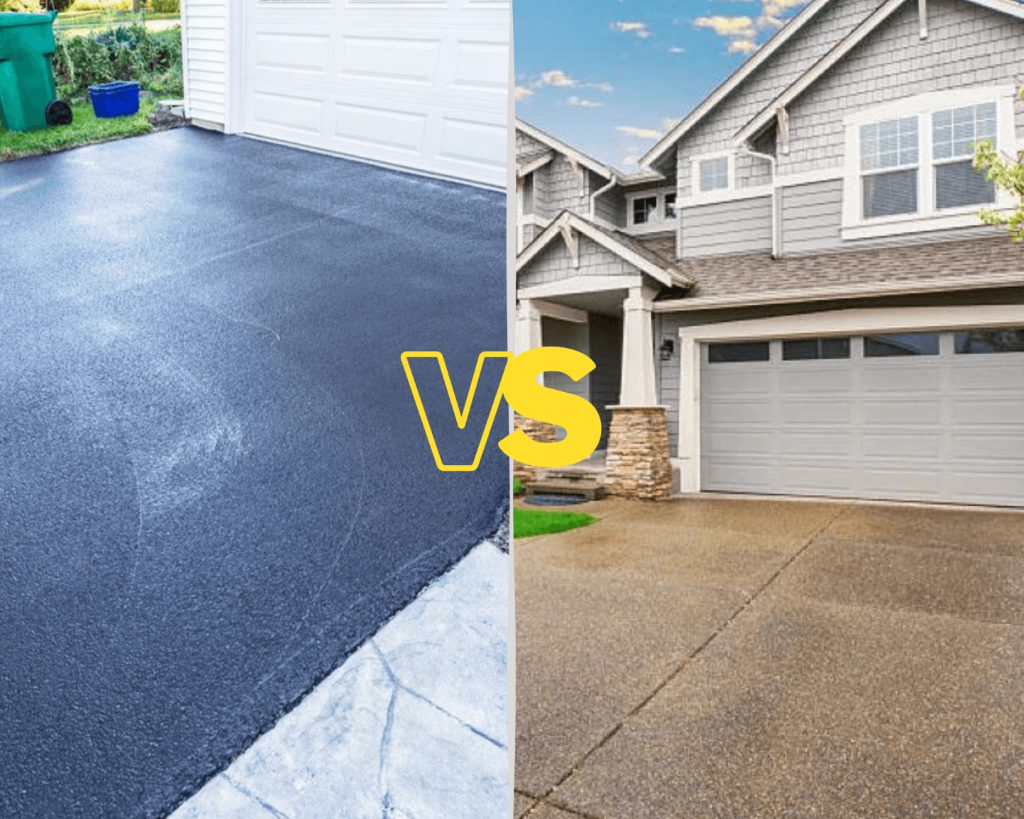When it comes to constructing a residential driveway, there are several important considerations and preparations that should be made. Depending on the size of the driveway and its intended use, both concrete and asphalt are viable options.
So which material is best used for your driveway? Read more as we’ll discuss more of the details on this matter of concrete vs. asphalt driveway in today’s article.
Concrete Or Asphalt?
Before beginning construction, property owners must first decide on the type of material they would like to use for their driveway. Asphalt and concrete are both durable materials that can withstand significant weight and wear. However, there are a few key differences between the two that must be taken into consideration.
Asphalt is generally less expensive than concrete when it comes to installation costs. It is also quick to install, requiring only about two days for completion.
The two main types of asphalt used for constructing driveways are hot mix and cold mix. Hot mix asphalt, also called HMA, is a mix of asphalt cement and aggregate. It’s heated to over 300°F (150°C) and placed in layers on roads or driveways. Hot mix asphalt provides an even surface with good durability and strength.
Cold mix asphalt, also called emulsified asphalt, is a mixture of asphalt cement and water. It’s not heated, so it is easier to work with than hot mix. Cold mix asphalt can be used as a base layer for more permanent surfaces such as hot mix asphalt or concrete pavements.
An asphalt driveway does require some maintenance, however, as it needs to be sealed every one to three years. Sealing helps protect the surface from cracking and other damage caused by exposure to extreme weather conditions.
Concrete is much more expensive than asphalt to install but can last significantly longer; properly cared for concrete driveways have been known to last over 25 years. However, concrete is more labor intensive and can take up to a week for installation. A concrete driveway requires very little maintenance; they should be swept regularly to remove any debris or dirt and sealed every few years.
For residential driveways, the most common type of concrete is a mix that contains cement, aggregate (coarse stones), and water. The ratio of the ingredients varies depending on the type of driveway being constructed. Concrete can be made to withstand extreme temperatures, making it ideal for areas with heavy snowfall or frequent freeze/thaw cycles. When properly maintained, a concrete driveway should last up to many years.
Which Is Quicker To Install?
When it comes to installing a driveway, homeowners face the decision of choosing between concrete or asphalt. Both have their advantages and disadvantages, but one factor that is often considered when making a choice is which type of driveway will be quicker to install.
Concrete driveways are typically faster to install than asphalt driveways. To begin installation, the driveway must be excavated, and a bed of gravel installed. This can be done quicker than the process for asphalt driveways, as there is no need to apply several layers of material before driving on it. Once the foundation is laid, concrete can be poured in one day and then left overnight to dry. In comparison, asphalt needs to be heated in a truck and then applied in several layers. This process takes longer.
In terms of cost, concrete is generally more expensive than asphalt driveways. This is due to the fact that materials such as gravel and sand need to be purchased to create a solid foundation for the driveway, while asphalt requires fewer materials. However, concrete tends to be more durable and last longer than asphalt, which may make it the better option in the long run.
Which Material Is Best If You Have A Large Or Multiple Vehicles?
Concrete driveways have long been seen as the preferred choice of material for those who own a large car or multiple vehicles. There are several reasons why concrete driveways are ideal for these types of vehicle owners.
To start with, concrete driveways offer a much more stable surface than asphalt driveways. Asphalt is made up of a combination of gravel, sand and bitumen which can be prone to shifting or sinking in large vehicles. Concrete is much more reliable and resilient to weight, making it the ideal choice for those with heavy cars or trucks.
Conclusion
When it comes to choosing between a concrete driveway or an asphalt driveway, both offer unique benefits that can be beneficial in different situations. It is important to consider the budget, size of the area and level of maintenance required when making a decision. With careful consideration, property owners can determine which option works best for their individual needs.

